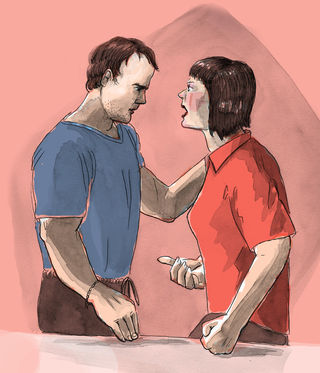Sex
When a Relationship Makes You Sick
Being controlled or abused can lead to multiple medical problems.
Posted June 17, 2016 Reviewed by Jessica Schrader

Isolated. Degraded. Manipulated. Threatened. Stalked. And sometimes subject to physical or sexual violence. It’s no wonder some people's relationships make them sick.
Coercive control is a strategy some people use to dominate their intimate partners—mostly men over women. It’s not just bossiness; it’s domination. Over time, people who are treated this way lose their autonomy, self-esteem, and sense of well-being. Between the direct acts of control and possibly violence, people in such relationships live in fear of doing anything that might anger their partners. The distress is ongoing, even during periods that seem calm. Additionally, some controlling people deliberately weaken their partners physically—making them miss sleep, restricting their access to food and medical care, forcing them to have unwanted pregnancies, pushing them to use alcohol or drugs, or beating or sexually assaulting them. In a recent case, a man in England was convicted of coercive control and domestic violence: He forced his wife to run on a treadmill, and prevented her from eating anything other than beets and tuna fish for weeks on end, all in an attempt to make her look "hotter."
Here are examples of how controlling people can directly interfere with their partner or ex-partners' health:
- Gita’s husband would not let her go anywhere unaccompanied. He insisted on sitting in on her medical appointments, explaining to the clinic staff that this was “cultural.”
- Cindy’s boyfriend insulted her appearance and eroded her self-esteem. She hated to have anyone look at her and could barely stand to see herself in the mirror. Cindy developed an eating disorder—binging in secret but hardly eating anything around others.
- Sam's boyfriend turned him on to an exciting life of clubbing and drugs. When Sam grew tired of the late nights and said he wanted to go to college, his boyfriend told him to get off his high horse and insisted they continue to use drugs together.
- Shanique’s wife made her cancel her counseling appointment, saying she was disloyal for wanting to tell others about their private matters.
- When Grace attended a routine checkup, her provider noticed that her breasts and arms were bruised. Grace said her boyfriend did it and it was “nothing.” The provider was alarmed but didn’t quite know what to ask to determine if Grace was safe.
- After their divorce, Tommy’s ex-wife, Sandra, stalked him. She called him at all hours of the day and night. She appeared, unwelcome, at his workplace and at places he liked to socialize. She seemed to know where he was at all times. Afraid she might have installed a GPS on his computer or phones, he bought new ones. Although the court order was clear about visitation, she obligated him to return to court every couple of month about trivial matters regarding their shared children. Tommy suffered debilitating migraines, insomnia and digestive problems.
- The medical staff noticed that Carmen had to check with her boyfriend about everything—which exams they could give her, where she should pick up her prescriptions, what medicines she should take, and referrals to specialists. They heard her explaining to him on her phone from the waiting room that she was delayed at the doctor’s and would be home soon. They saw her snap a photo of the waiting room, as if to prove her whereabouts.
- Janelle's husband severely restricted her movements but was often out late at night with no explanation. He refused to let her use contraceptives and sometimes "inspected" her vagina, looking for "signs" that she was unfaithful. She was distraught when her medical provider diagnosed her with herpes and syphilis, which her husband had apparently contracted and given to her.
- Tammy was transitioning to life as a woman, taking hormones and engaging in surgeries to make her appearance more in keeping with how she felt inside. Tammy depended on her boyfriend to pay for the medications and procedures. Occasionally he'd hide Tammy's medication as a "punishment" when he felt Tammy had not been sufficiently submissive. Stopping the hormones cold turkey this way made Tammy feel moody and sick.
People whose partners abuse them live with near constant anxiety and fear; this also causes physical changes. Victims of coercive control frequently experience medical problems including heart trouble; non-specific head, back, and stomach pains; and difficulty sleeping and eating. Patients often don’t realize their relationship is the cause of their ailments. Being controlled by a partner can also contribute to psychological symptoms such as depression, anxiety, substance abuse and suicidal feelings. Providers sometimes prescribe medication, tests, and referrals to specialists for a problem that has roots in the patients' intimate relationship.

Physical violence and coercive control reinforce each other. Even minor acts of physical violence make it easier to control a partner and intensify the effects of insults and threats. Similarly, people who feel entrapped and isolated become more afraid of physical blows. The abuser uses whichever tool seems to make the most sense at a given moment, including loving acts, to make the partner more compliant.
“Sex on demand” is a common rule in coercive control relationships. A victim who tries to decline sex may be accused of not loving a partner or cheating on him or her, or may simply be pushed until he or she gives in. If the partner uses physical force to get sex even once, the victim knows she has no real choice.
The line between violence and safety can be especially blurry during sex. If an abuser insists on sexual activities that a woman says she does not want, or handles her sexually in a way she has said she does not want, or gets her drunk or high so she will do things she does not want to do, then he is victimizing her sexually. A woman will often give her partner the benefit of the doubt if painful acts occur during sex. She decides to define the actions as passion rather than violence; this allows her to avoid a risky confrontation.
People who use coercive control against partners can go out of their way to seem charming and helpful to others. The person being controlled, meanwhile, struggles to keep up appearances—afraid to talk about what is really going on in their relationship. Victims tend to blame themselves as well: If only she could “be better,” she thinks, maybe her partner wouldn’t degrade or hurt her. If she tries to end the relationship or demands changes, the threats escalate.
Coercive control can be hard to recognize. It is important to take stock of the ways one is being controlled. Sometimes abusers can change; however, more commonly, an abuser's grip tightens over time and the person being controlled becomes less and less free. Domestic-violence advocates help people who are being controlled develop safety plans, even if they are not physically abused and choose to remain in the relationship. It is crucial to remember that physical, psychological, and social recovery is possible. Relationships can make people stronger—and no one should have to stay in a relationship that makes them sick.
For information on coercive control in same-sex relationships, click here
References
Stark, E. (2010). Do violent acts equal abuse? Resolving the gender parity/Asymmetry dilemma. Sex Roles, 62, 201-211.


